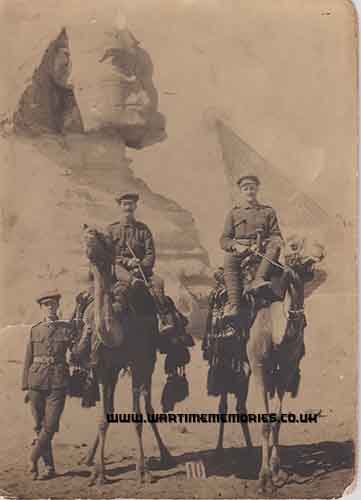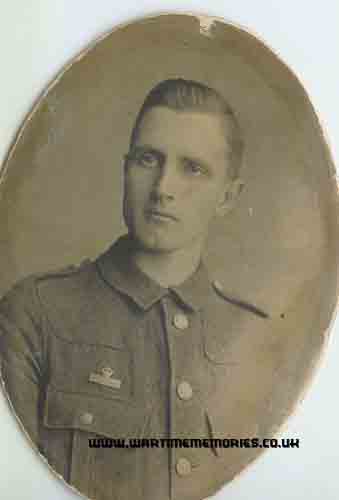Additions will be checked before being published on the website and where possible will be forwarded to the person who submitted the original entries. Your contact details will not be forwarded, but they can send a reply via this messaging system.
please scroll down to send a message
Pte. John Brown
British Army 2nd Lowland Field. Amb. Royal Army Medical Corps
from:22 Woodville Gardens, Langside, Glasgow
(d.27th May 1918)
"Heliopolis, Cairo, Monday 24th January 1916
Dear Folks, How one’s surroundings change! The last letter I wrote outside a tent looking out upon the mipuad mastered harbour of Mudroc. Tonight I write in the beautiful white walled room of the American Mission & YMCA on the ancient city of Heliopolis, a suburb of Cairo. A stalwart Australian is playing hymns on the piano, and the room is busy with Tommies, chattering or writing like myself to the dear old homeland. Yes as Mr Houston would say “It’s good to be here.†You can imagine what a delightful change it is to us to get back to civilization after the monotony of four months in a barren wilderness, under continuous shell fire. Pour old Gallipoli, she remains a memory of ‘whizzes & bangs’ and the sweet sighing of bullets on the wing. You couldn’t walk a yard out of camp without taking a considerable risk – when you went for a bathe it was not altogether certain that you would wholly enjoy it. Johnny Turk might just take it into his head to shell the beach at that particular time, and latterly it was madness to go near the beach unless you simply must.
I shall never forget the night we left the Peninsula. It was a strange experience leaving your dug out at ten minutes notice. The night was black except when it was illuminated by the flashes of the Turkish guns, firing steadily both from Achi Baba & the Asiatic side of the Straits. These gentlemen seemed to know that we were evacuating and they were giving us the best send off they jolly well could, which was a very lively one as I can vouch for, (bother that old pen – no not working well tonight.) Well we bundled our goods together with a parting glance of farewell at the old earth homes of many memories we fell, and marched in loose order up the road past the cemetery to the brow of the ridge where some of us turned to take a final look at the hill of tragedy and romances - Achi Baba, silhouetted against the sky in the light of the star shells that rose slowly full all along the firing line. Now for it! We were entering the perilous zone – a strip of road that ran from the ridge through a great cleft in the rocks down to the beach. This road and the beach itself were being heavily shelled, and it was a death trap. On we went, in a staggering line. Just at the corner where the road dips down to the beach was a spot which we know we could not pass without a shell landing close by. We got there – the flash of the Turkish gun showed vividly over the ridge – and we threw ourselves down. The shell burst a few yards from the road but not one of us was hit, after as we turned the corner I saw a poor fellow half naked cowering into the shelter of the rock, being attended to by someone who was tearing his clothes to find the wound. Well to shorten the story, we had to wait first for an hour on the beach, then two hours on a lighter at the jetty. How we escaped without a casualty in our party was marvellous. The beach was packed with men and mules and there were men killed and wounded all around us. Two men – not RAMC were wounded on our lighter, as we lay at the jetty. Well after three hours of this we got off and steamed on to the ship awaiting us, and we were jolly thankful to lie down on deck and get a sleep. In the morning we left for Mudros where we arrived a few hours later. Although the final evacuation did not take place until several nights later – when it was marvellously successful – we have since heard that the night we left, Sunday 2nd Jan. was the worst night of the whole evacuation. To proceed with history – we lay at Mudros for a fortnight & embarked on the “Ionianâ€, an old Allan liner. We did not sail till Wednesday morning. The voyage was pleasant & uneventful. We arrived at Alexandria on Friday and entrained for Cairo next morning."
John Brown died in 1918, aged 23.

